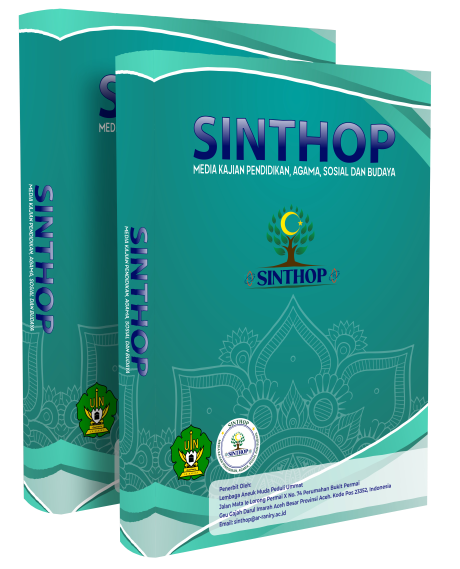Muamalah dalam Islam: Memahami Konsep 'Ariyah dan Aplikasinya
DOI:
https://doi.org/10.22373/sinthop.v2i2.4074Keywords:
'Ariyah, Hukum Islam, MuamalahAbstract
The concept of 'Ariyah in Islam, within the framework of Muamalah (human interaction), holds a significant place in the social and economic aspects of Muslim life. This paper aims to explore the etymological and terminological dimensions of 'Ariyah and its practical implications in Islamic law. Employing a qualitative approach, this study draws on religious texts, including the Qur'an and Hadith, as well as scholarly works on Islamic jurisprudence. The analysis reveals that 'Ariyah, etymologically, is associated with the idea of borrowing and returning, and terminologically refers to the practice of utilizing another's possessions without compensation. This concept encompasses values of generosity and unconditional giving, with slight variations across Islamic schools of thought. The validity of 'Ariyah transactions in Islamic law depends on certain pillars and conditions, such as the declaration of borrowing, the ownership status of the lender and borrower, and the nature of the borrowed item. The concept of 'Ariyah aligns with the broader Islamic ethos of assistance and reciprocal cooperation, particularly in the practice of lending.
Abstrak
Konsep 'Ariyah dalam Islam, dalam kerangka Muamalah (interaksi manusia), memiliki tempat yang signifikan dalam aspek sosial dan ekonomi kehidupan Muslim. Tulisan ini bertujuan untuk mengeksplorasi dimensi etimologi dan terminologi dari 'Ariyah dan implikasi praktisnya dalam hukum Islam. Menggunakan pendekatan kualitatif, studi ini mengacu pada teks-teks agama, termasuk Al-Qur'an dan Hadits, serta karya-karya ilmiah tentang jurisprudensi Islam. Analisis mengungkapkan bahwa 'Ariyah, secara etimologi terkait dengan ide peminjaman dan pengembalian, dan secara terminologi merujuk pada praktik memanfaatkan kepemilikan orang lain tanpa kompensasi. Konsep ini mencakup nilai-nilai kemurahan hati dan pemberian tanpa syarat, dengan sedikit variasi lintas mazhab Islam. Keabsahan transaksi 'Ariyah dalam hukum Islam bergantung pada rukun dan syarat tertentu, seperti deklarasi peminjaman, status kepemilikan pemberi pinjaman dan penerima pinjaman, serta sifat barang yang dipinjam. Konsep 'Ariyah ini sejalan dengan etos Islam yang lebih luas tentang bantuan dan kerja sama timbal balik, terutama dalam praktik peminjaman.
References
Abidin, M. A. bin. (1992). Hasyiyah Radd Al-Mukhtar ‘Ala Ad-Durr Al-Mukhtar, Juz 8. Dar Al Fikr.
Al-Baihaqi, A. B. (2003). Al-Sunan Al-Kubra, Juz. 6. Darul Kitab Al-Ilmiyah.
Al-Din, A. B. I. M. T. (n.d.). Kifayah al-Abyar. Alma’arif.
Al-Jaziri, A. (2004). Kitabul Fiqh ‘Ala Mazahibul Arba’ah. Dar Al Fikr.
Al-Qaradhawi, Y. (2010). Tujuh Kaidah Utama Fikih Muamalah, Terj. Fedrian Hasman. Pustaka Al-Kautsar.
Al Jawi, M. nawawi I. U. (1998). Qut al Habib al gharib : Tausyih ala fat al qarib al mujib. Dar al Kutub al Ilmiyah.
Al Marbawi, M. I. A. R. (2015). Kamus Arab Melayu. Dar Al Fikr.
Anis, I. (1972). Al-Mu’jam al-Wasith, Juz 2. Dar Ihya’At-Turats al-‘Arabiy.
As-Shan’ani. (1995). Subulussalam, Terj. Abubakar Muhammad. Al-Ikhlas.
Az-Zuhaili, W. (1989). Al-Fiqh Al-Islamiy wa Adillatuhu, Juz 5. Dar Al Fikr.
Az-Zuhaili, W. (2004). Al-Fiqh fi Islami Wa Adillatuh. Dar Al Fikr.
Az-Zuhaili, W. (2011). Fiqih Islam wa adillatuhu. Gema Insani Press.
Haroen, N. (2007). Fiqh Mu’amalah. Gaya Media Pratama.
Irfan, I. (2020). KONSEP AL-MU’AWANAH DALAM AL-QUR’AN (Suatu Kajian Tafsir Tematik). Al-Tadabbur, 6(2), 279–291. https://doi.org/10.46339/ALTADABBUR.V6I2.366
Jamaluddin. (2018). KONSEKUENSI AKAD AL-ARIYAH DALAM FIQH MUAMALAH MALIYAH PERSPEKTIF ULAMA MADZAHIB AL-ARBA’AH. Qawãnïn Journal of Economic Syaria Law, 2(2), 1–15. https://doi.org/10.30762/q.v2i2.1038
Kamri, A., & Fairuz Ramlan, S. (2015). THE APPLICATION OF ḤABL MIN ALLĀH AND ḤABL MIN AL-NĀS ELEMENTS IN ISLAMIC CODE OF ETHICS: AN EXPLORATORY CASE STUDY. International Journal of Economics, Management and Accounting International Journal of Economics Management and Accounting, 23(1), 57–78. https://www.researchgate.net/publication/283506477_THE_APPLICATION_OF_HABL_MIN_ALLAH_AND_HABL_MIN_AL-NAS_ELEMENTS_IN_ISLAMIC_CODE_OF_ETHICS_AN_EXPLORATORY_CASE_STUDY
Mandzur, I. (n.d.). Lisanul Arab (3rd ed.). Dar al-Ma’rif al-Ilmiyah.
Munawwir, A. W. (1997). Kamus Al-Munawwir Arab-Indonesia (Mashum (ed.)). Pustaka Progressif.
Nur, I., Asiyah, B., Puspitarini, R., & Umam, S. (2019). Probing Islamic Values of Business Principles and Ethics. International Journal of Scientific Research and Management, 7(10). https://doi.org/10.18535/ijsrm/v7i10.em06
Paoletti, G. (2012). Durkheim’s “Dualism of Human Nature”: Personal Identity and Social Links. Durkheimian Studies, 18(1). https://doi.org/10.3167/ds.2012.180105
Quthb, S. (2002). Tafsir fi zhilalil qur’an dibawah naungan al-qur’an, Jilid 1. Rabbani Press.
Rozalinda. (2016). Fikih Ekonomi Syariah. PT Raja Grafindo Persada.
Shihab, M. Q. (2010). Tafsir Al-Mishbah. Lentera Hati.
Suhendi, H. (2022). Fiqh Muamalah. Raja Grafindo Persada.
Syafe’i, R. (2006). Fiqih Muamalah. Pustaka Setia.
Syafi’i, T. ad D. A. B. ibn M. al H. al H. ad D. asy. (1980). Kifayah al akhyar fi ghayah al ikhtishar. Toha Putra.
Wahyudin, W. (2022). Reviewing of Islamic Law on the Practice of Lending Money Through Mobile Banks. International Conference on Islamic Economic (ICIE), 1(1), 80–95. https://doi.org/10.58223/icie.v1i1.108
Downloads
Published
How to Cite
Issue
Section
License
Authors who publish in SINTHOP: Media Kajian Agama, Sosial dan Budaya agree to the following terms:
- Authors retain copyright and grant the journal right of first publication with the work simultaneously licensed Attribution-ShareAlike 4.0 International (CC BY-SA 4.0) that allows others to share the work with an acknowledgment of the work's authorship and initial publication in this journal.
- Authors are able to enter into separate, additional contractual arrangements for the non-exclusive distribution of the journal's published version of the work (e.g., post it to an institutional repository or publish it in a book), with an acknowledgment of its initial publication in this journal.
- Authors are permitted and encouraged to post their work online (e.g., in institutional repositories or on their website) prior to and during the submission process, as it can lead to productive exchanges, as well as earlier and greater citation of published work. (See The Effect of Open Acces)









.png)

.png)
.png)
.png)


